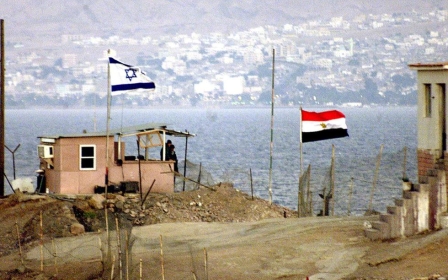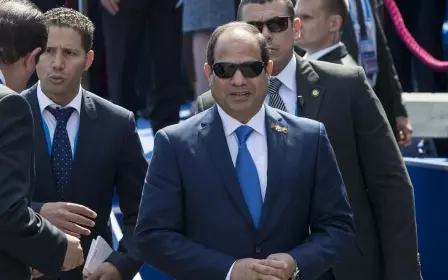New Israel envoy shows Egypt wants to improve relations: Analysts

CAIRO – Analysts have described a decision by Egypt's President Abdel-Fattah al-Sisi to name a new ambassador to Israel as a sign of Egypt’s commitment to a landmark peace treaty with the self-proclaimed Jewish state.
Egyptian authorities on Sunday appointed Hazem Khairat, an assistant foreign minister for diplomatic and consular affairs, as its ambassador to Israel.
The move came to fill in a post that had been vacant for three years since former President Mohamed Morsi recalled the Egyptian envoy from Israel in 2012 in protest of an Israeli offensive on the Gaza Strip.
"Appointing a new ambassador to Tel Aviv after three years represents a major shift in Egyptian-Israeli relations," Tareq Fahmi, a political science professor, told Anadolu Agency.
"[The appointment] reaffirms Egypt’s commitment to continuing contacts with the Israeli government as part of their peace treaty," he said.
Egypt and Israel signed a landmark peace treaty in 1979 following a six-year military conflict over the Sinai Peninsula.
Despite their peace treaty, Egypt and Israel still remain in a state of cold peace.
Israel, which had occupied Egypt's Sinai Peninsula for six years prior to the 1973 Arab-Israeli War, is still seen in an overwhelmingly negative light among much of the Egyptian public.
'Practical commitment'
Fahmi, the head of the Israeli studies unit at the National Center for Middle East Studies, cited two reasons for the Egyptian move to reinstall its envoy to Israel.
"Egypt had to show a practical commitment to its peace treaty with Israel, especially that the latter complied with the Egyptian demands for deploying troops in Sinai," he said.
Egypt has deployed additional forces in the Sinai Peninsula to combat militancy in the restive region.
The Camp David peace treaty places limitations on the deployment of Egyptian troops in Sinai.
"The move also reflects Egypt’s desire to play its role on regional and Arab levels," Fahmi said. "Egypt aimed to send a message to all parties that it’s now part of the equation, particularly in terms of negotiations between Hamas and Israel."
'Unavoidable'
Mansour Abdel-Wahab, an expert on Israeli affairs, described as "natural" the appointment of a new Egyptian envoy to Israel.
"The move reflects the commitment of the Egyptian president to the signed treaties," he said.
He argued that the presence of an ambassador "helps facilitate dialogue and solve crises".
For his part, Assem al-Dosoki, a professor of modern history, sees the envoy’s appointment as "unavoidable".
"The president had no option but to either severe relations and take the consequences or keep them," he told Anadolu Agency.
He noted that the Egyptian government sees the appointment of a new ambassador as "the most appropriate option, especially that the US administration supports Israel and does not accept any hostile action against it".
Middle East Eye propose une couverture et une analyse indépendantes et incomparables du Moyen-Orient, de l’Afrique du Nord et d’autres régions du monde. Pour en savoir plus sur la reprise de ce contenu et les frais qui s’appliquent, veuillez remplir ce formulaire [en anglais]. Pour en savoir plus sur MEE, cliquez ici [en anglais].




